Madrasa Sayyidna Usman Lil Banat for Girls, imparting both worldly and religious education. The students here are also achieving the happiness of memorizing the Quran.
- Those who seek a purposeful and dignified life, acquire knowledge.
- Those who seek reward more than recompense, educate.
- Those who are mindful of seeking cool shadows on the hot Day of Resurrection extend their hand for help.
It is undeniable fact that Ilm (Education) is the most noble path to honor, dignity, and success in both the temporal realm and in the Hereafter. Ilm or Taleem is the hallmark of humanity, setting us apart from all other creatures. In fact, With the aid of knowledge, humans have transformed rocky valleys, barren plains into fertile, productive and verdant environments, have unearthed countless mineral treasures from the floor of the earth and seabed, embarked on new frontiers of research and exploration by reaching into the heights and expanses of the sky, unfurling new banners of discovery.
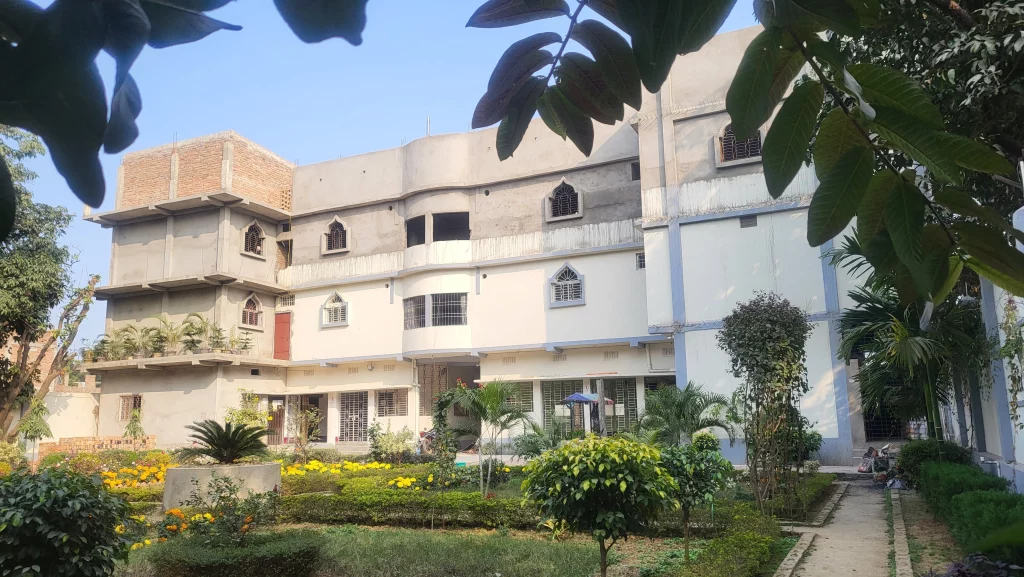
The first command that Islam has given to the Prophet Muhammad ﷺ in the horrible environment of darkness and ignorance was about education (Iqra, Read). Islam has laid much emphasis on the importance and need of Education in the earliest verses of the Holy Qur’an from the very first day. Page 3. The Holy Qur’an exalts the status of knowledge by consistently highlighting the distinction between those who possess it (Aalim) and those who do not (Jahil, ignorant) and encourages for it.
Similarly, it is an established fact that women across all nations play a vital role in enlightening their societies with religion, enriching them with civilization and culture, and enhancing the moral fabric of their people. The significance of women in developing societies and nurturing individuals is self-evident. Indeed, a mother’s embrace serves as a profound educational and Tarbiyah institution for children, imparting lessons and values that endure a lifetime. In Islam, the teachings are directed towards both men and women equally. This is why to seek Islamic education, it is equally incumbent upon both men and women.
Keeping this need in mind, for a considerable period of time, there has been a pressing need of educational institutions specially for girls in Bhagalpur and its neighbouring areas, where they can gain proficiency in Islamic and modern education, including Arabic, Urdu, English, Hindi, and computer studies, while also becoming Hafiza and Aalima.
In response to this need, Madrasah Sayyidna Usman for Lil-Banat was established. The Darul-Iqama (Hostel) of the Madrasah was inaugurated on October 10, 2021. Since then, girls from various areas have been receiving both religious and secular education in Islamic and sound environment. Alhamdulillah!
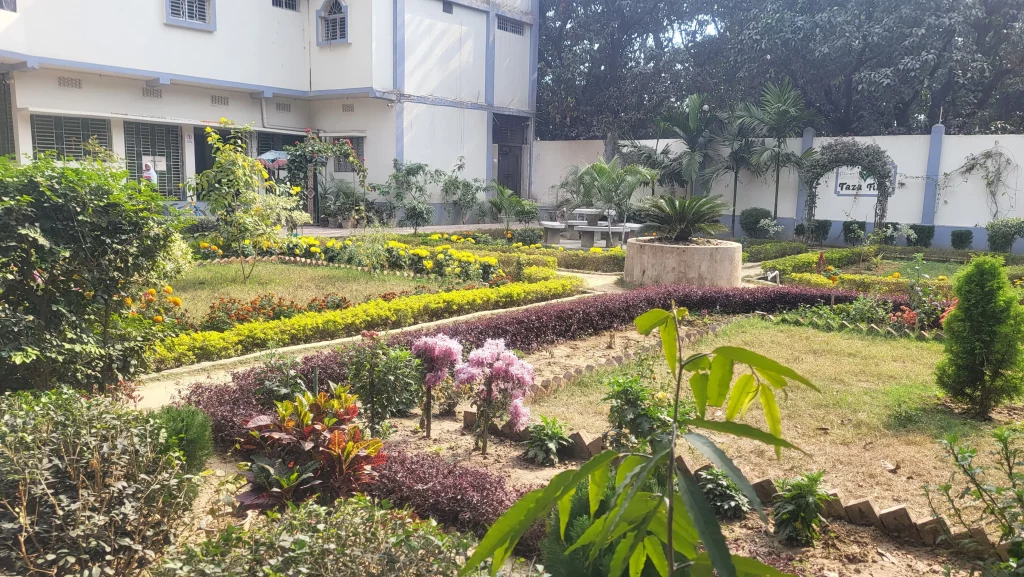
Our endeavor is to provide these girls with both religious and modern education while residing in a complete Islamic environment. They should acquire the knowledge of the Quran and Hadith, be proficient in Arabic, Urdu, Hindi, English, Persian, and computer science. This will enable them to teach and impart Islamic education and Tarbiyah among women from all walks of life and They could be role model and Ideal Muslimah for the women.
In the following pages, we present a brief outline of some of the rules, regulations, and the curriculum of Madrasah Sayyidna Usman Lil-Banat. May Allah help and support you! Jazakallah Khaira.
Our Educational Objectives
Madrasa Sayyidna Usman Lil Banat is to provide girls with education in an Islamic, safe and sound environment, while adhering to the practice of wearing the Hijab. The Madrasa aims to cultivate piety, good moral standards, and a sense of educational awareness, while discouraging non-Sharia’h practices. Additionally, it seeks to instill the habit of following the Sunnah, maintaining proper domestic etiquette, and integrating Islamic principles into all aspects of life, with a focus on pure religious and da’wah attributes.
The Madrasa aspires for the girls to reside within a nurturing Islamic atmosphere, where they can pursue both Islamic and contemporary education. This holistic approach aims to foster proficiency in the Qur’an, Hadith, and Arabic, as well as in Urdu, Hindi, English, Persian languages, and computer science. Through this comprehensive learning, the Madrasa aims to empower its students to spread the teachings of Islam to women from all walks of society, becoming an exemplary role models through their actions for other women.
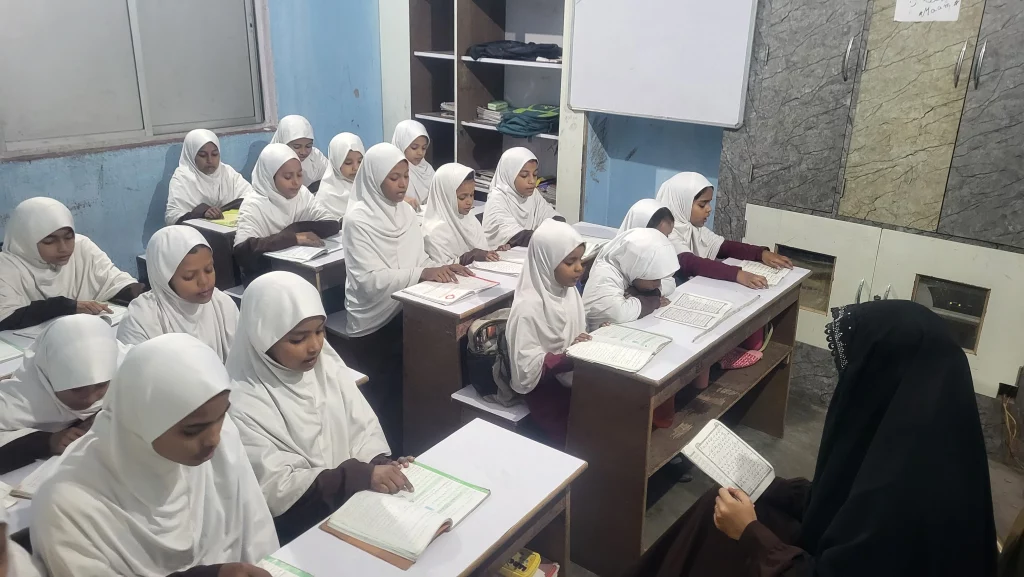
The Madrasa aims to provide with such exemplary women who are equipped with expertise in Islamic sciences, Shariah, and contemporary education, so that they can proficiently and comprehensively represent the teachings of Islam to the women worldwide. Furthermore, the Madrasa seeks to inculcate correct Islamic beliefs and a deep love for Islam in its students, empowering them to spread Islamic teachings confidently in society.
Additionally, it aims to provide girls with a comprehensive modern education, encompassing proficiency in the Holy Quran, Hadith, Fiqh, Tafsir, Usul al-Tafsir, Usul al-Hadith, Arabic language and literature, Urdu, English, Hindi, Persian languages, and computer science.
Educational System of the Madrasa
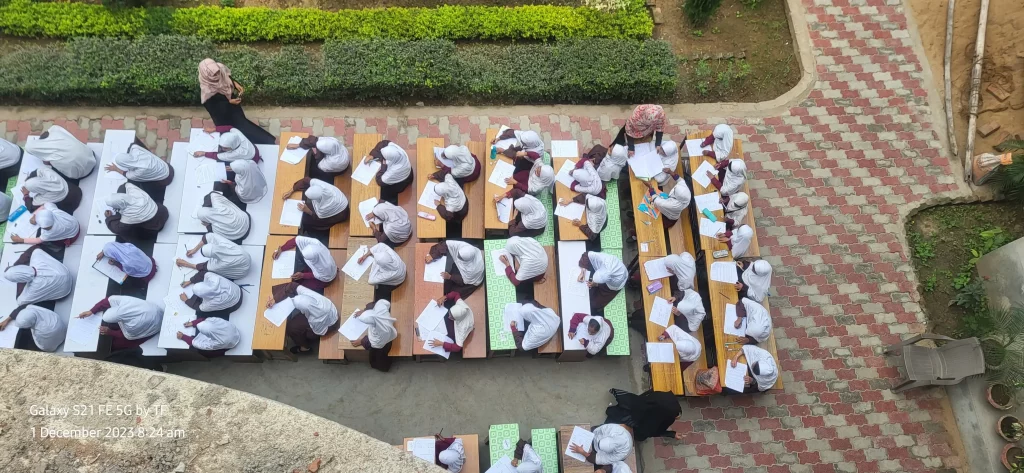
The education at Madrasah Sayyidna Usman Lil-Banat is divided into two phases: E’dadiyah (Elementary Course) and Aalimiyat.
Madrasah Sayyidna Usman Lil-Banat is an exclusive religious and educational institution dedicated to providing girls with a comprehensive education encompassing both religious and modern studies. The complete duration of the education program is typically eight to nine years in the Madrasa, which includes the Memorization of the Quran, Aalimiyat, and modern Education in English from the first to the eighth standard, tailored to age and capacity of the students.
Considering it, the educational curriculum has been designed to ensure that within these eight (8) years, the girl can complete Aalimiyat course (religious studies) along with modern education up to the eighth grade in English medium while bright and intelligent students may also complete the memorization of the Quran during this period.
E’dadiyah (Elementary Course): This phase spans the first three years of education and includes Nazra Quran Noorani Qaida, memorization of three Ajza (Paras) of the Quran, basic Arabic language, basic studies in Arabic grammar and morphology, two paras of the Quran with Urdu translation along with basic Arabic translation skill and English language. Additionally, students cover three years of modern education (equivalent to classes 1 to 3 in English medium).
During this phase of E’dadiyah, students develop the ability to translate Arabic and English texts into Urdu accurately, learn the complete and correct of way of performing daily prayers (Masnoon Duas), including Azkar (Duas and Zikr) and Salah with their translation, and begin reading texts with the basic rules of Arabic grammar and morphology. In addition to this, the curriculum includes Aqa’id (beliefs), Arabic grammar, Arabic language literature, Fiqh (Islamic jurisprudence) and basic Arabic books of Hadith along with receiving basic computer education.
Aalimiyat: Aalimiyat represents the second stage of the academic phase. This stage encompasses the memorization of the complete Quran with translation, books of Fiqh in Arabic, Aqa’id, Arabic grammar and morphology, Usool al-Fiqh (principles of Islamic jurisprudence), Tafseer al-Qur’an, Usool al-Tafseer, Hadith, Usool al-Hadith, as well as good proficiency in Arabic and English translation skills. Additionally, it includes knowledge of computers and five years of contemporary education (from Class IV to Class VIII) in English medium. Upon completion of this stage, students will have the ability to understand the Quran and Hadith, translate Arabic and English books into Urdu, and explain the Quran and Hadith well. Furthermore, they will have completed modern education up to the eighth standard in English medium. This is the academic system of eight years of basic education. Upon its completion, parents can get their daughters’ modern education completed in any English medium school or government board.
Academic Curriculum
The Madrasa offers two stages of education at each level, and the following curriculum is completed in both stages.
Edadiyah 1st Year:
- Noorani Qai’da
- Nazrah (reciting the Holy Quran by looking at the Quran) A’mma Parah (30th Juz of the Quran) with Tajweed, followed by memorization of the same Parah
- Nazrah Quran up to the third Juz of the Quran
- 1st, 2nd, and 3rd books of Urdu language
- Bachhiyon ke liye Islami Course (Islamic Course for Girls), Part I and II
- Minhaj al-Arabiyyah I (Urdu and English)
- Miftah al-Arabiyyah I (with Urdu and English translation)
- Taleem al-Islam I, II, III Parts (memorization of all three parts)
- Islamic Studies First (with Urdu translation)
- Hindi, English, and Science as per NCERT Syllabus
- Mathematics as per NCERT Syllabus
- Who is Allah (with Urdu translation)
Edadiyah 2nd Year:
- Complete 3 Parahs of the Quran (Hifz)
- Nazrah:10 Parahs of the Quran
- Miftah Al-Quran First and Second Part
- Bachhiyon ke liye Islami Course (Islamic Course for Girls (3rd, 4th, and 5th parts)
- Islami Aadab Behishti Zewar First and Second Part
- Al-Qirat Al-Wadhiha First Part
- Qisas Al-Nabiyyeen First Part
- Rasool-e-Arabi, Rahmat-e-Alam
- Aasan Sarf ( by Heart)
- Islamic Studies Grade 2 (with Urdu Translation)
- I Love Islam (with Urdu Translation)
- Hindi, English, and Mathematics as per NCERT Syllabus
Edadiyah 3rd Year:
- Hifz al-Qur’an —Parah 3 to 9—. Translation of the Qur’an (5 Parahs)
- Bahishti Zewar (Part 3, 4, 7, 11)
- Al Fiqh Al Muyassar
- Asan Nahw
- Al-Nahw Al-Wadih)
- Muallim-ul-Insha Part 1
- Forty Ahadith with Urdu and English Translation
- Khilafat-e-Rashidah
- English Translation Skill
- General Knowledge
- Hindi, English, and Mathematics as per NCERT Syllabus
This is an outline of the three-year Edadiyah education curriculum, followed by the Aalimiyat course, which includes Hifz al-Qur’an along with translation, Islamic Fiqh (Islamic jurisprudence), Usool al-Fiqh, Hadith, Usool al-Hadith, Arabic Grammar and morphology, Biography of Prophet Muhammad ﷺ, history. In addition, modern education is provided in English medium.
Amenities
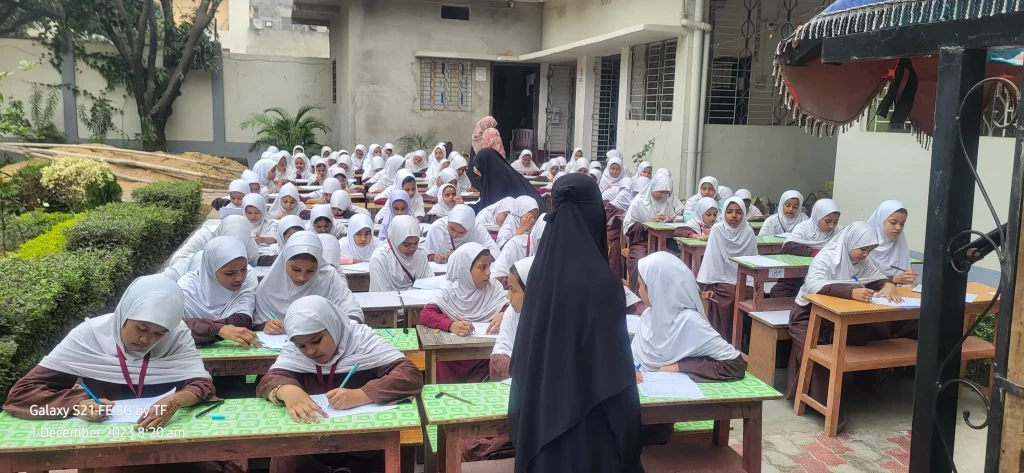
- The madrasa building is equipped with CCTV cameras to ensure continuous surveillance.
- Accommodation for female students is meticulously organized and supervised by female staff.
- Students have access to facilities to stay in touch with their families
- The madrasa offers Islamic education, Prophetic along with contemporary education.
- The curriculum at the madrasa (Islamic and contemporary syllabus) is same for all girls.
- In addition to academics, emphasis is placed on adopting the teachings of Prophet Muhammad and his Sunnah, humility, and humbleness and Dua and Zikr.
- The madrasa provides laundry services for students’ clothes.
- The madrasa provides three meals a day (breakfast, lunch, and dinner) for all students.
- Syllabus books, stationery, and other essentials are available on the premises of the madrasa at reasonable prices.
- Students are trained not only in academics but also in spreading and promoting Islam and its teachings.
- Each girl undergoes step-by-step training in sewing, embroidery, and designing.
- In addition to academic education, students are also taught and trained in household chores.
- Students from Bihar State undergo examinations conducted by Bihar State Madrasa Education Board.
- Orphans, poor, and needy students are exempt from monthly fees, and all their needs are taken care of by the madrasa.
Admission Rules:
- Only those girls who are committed to becoming complete Aalimah will be considered for admission to the seminary.
- The student’s age at the time of admission should be between seven and ten years.
- Admission is reserved for girls capable of independently performing personal tasks such as Wudu (ablution), Ghusl (Bathing), eating, drinking, and making their bed.
- Girls with infectious diseases or disabilities in the eye, ear, tongue, hand, or foot cannot be admitted due to the lack of adequate facilities to accommodate their needs.
- Before enrolling in the Edadiya course, students must pass an entrance exam covering four books: Complete Noorani Qaida, Urdu Ka Qaida Complete, Bada Hindi Akchar Bodh, and Good English. Failure to pass this test will result in the denial of admission.
- A male guardian must accompany the student at the time of admission.
- No recommendations will be considered in case of failure in the entrance test.
- Compliance with all the conditions set by the madrassa for admission is mandatory.
- At the time of admission, photocopies of the student’s Aadhaar card, the parents’ Aadhaar cards, those of any two Mahram relatives, and two passport-size photographs of each must be submitted.
- The admission fee, cost of uniform, cost of books, and one month’s fee must be submitted at the time of admission.
- Once the admission is approved, the student’s name will be registered at Darul-Iqama (hostel) only after providing the required items for the student.
- Signing the admission form is a confirmation that you fully agree to all the written and verbal rules and instructions of Madrasah Sayyidna Usman Lil-Banat and acknowledge their adherence.
- Admission is subject to the condition that the student, parents, and guardians will abide by the rules and regulations of the Madrasa, including attendance, leave, uniform, timely payment of fees, and instructions issued by the management from time to time. Admission will be cancelled in case of non-compliance with the rules, and no fee will be refunded in such cases.
- Registration for admission begins on 1st Rajab al-Murajjab ((the 7th Month of Islamic Calendar) every year, and the last date for registration is 25th Sha’ban al-Muazzam (the 8th Month of Islamic Calendar).
- The admission process should be completed by 11th, 12th and 13th of Shawwal al-Mukarram (the 10th Month of Islamic Calendar).
- For admission, you can visit Madrasa Sayyidna Usman Lil Banat, Burhapura, Bhagalpur, from 8 AM to 1 PM. You can also inquire about the admission details over the phone during these hours.
Academic Schedule:
Academic Timings: The academic timings vary based on the grade levels and seasons. Generally, the study period is six hours in the morning and two hours after Maghrib Salah.
Computer Classes: Computer classes are scheduled according to the students’ convenience and their respective grades.
Weekly Holiday: Female students have Sundays off, so that their guardians can visit them. Additionally, beyond the regular academic curriculum, training for various household chores is conducted on Sundays.
Annual Vacations: There are 25 days of annual vacations distributed throughout the year, with the duration varying based on the time and circumstances. Furthermore, three days of leave are granted on the occasion of a very close relative’s marriage.
Attendance Policy: Students must attend the Madrasa on the first day after holidays. Absence for more than three days without a valid reason will lead to the cancellation of admission.
Leave Policy: Leave will not be granted during academic days for minor reasons such as a relative’s engagement, going on Hajj, or returning from Hajj etc..
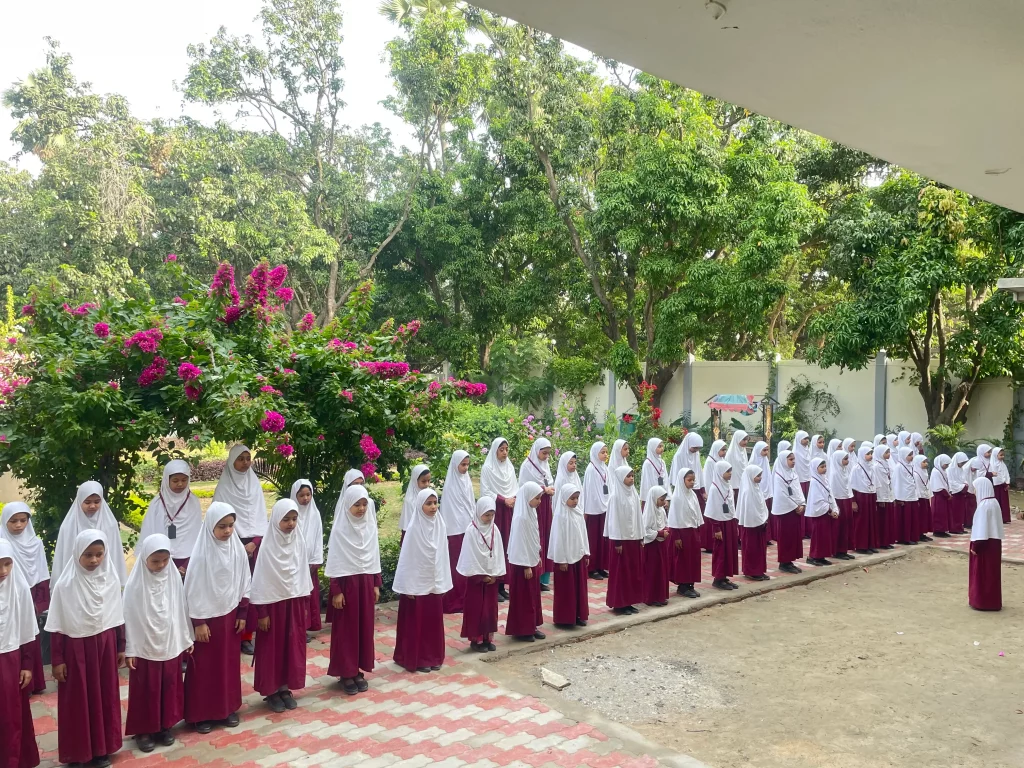
Recreation Time: After Asar Salah, the Madrasa allocates time for sports, exercise, and entertainment within the premises.
Examination Rules: If a student fails in any subject in the annual examination, she will have to take a supplementary examination. Failure in two subjects necessitates repeating the year. If the repeat year is also failed, admission will be cancelled and no excuses or recommendations will be considered in this matter.
